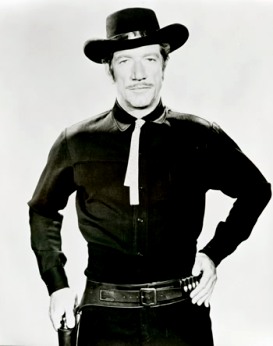Back in the rough and tumble of the old west (courtesy of ‘50s-‘60s television) justice was the theme and Paladin its most ardent champion. In fact, the name comes from the twelve knightly champions of the medieval king, Charlemagne.

Have Gun – Will Travel was the calling card of the man dressed in black, and who was, essentially, a gun for hire… with one important twist: no matter who hired him, Paladin was always willing to look at the overall and assess the situation from several perspectives. His singular agenda was justice.
The symbol of a knight on Paladin’s black leather holster was the metaphor for his profession. “It’s a chess piece, the most versatile on the board. It can move in eight different directions, over obstacles, and it’s always unexpected.” Paladin preferred to settle disputes without violence. However, he always made clear, at the beginning of every show, that if pulled into a fight, he was unafraid to use his gun.
In watching some of the Have Gun – Will Travel marathon this past weekend, I couldn’t help but marvel at this justice fighter’s uncanny insight into who was right and who was wrong. Although many of those early plot lines were a little obvious, some provided interesting dilemmas.
One episode has Paladin hired by a wealthy banker to catch an outlaw who threatened to take his revenge on the banker who testified against him. After outsmarting and catching the outlaw, Paladin has a turn of compassion when he learns that the man wants one last chance to see his wife and baby before returning to a probable hanging. Although, it may look like a trick, the man in black is deftly able (thanks to early TV standards) to determine that the man is telling the truth. Although justice is ultimately served, Paladin sees that the killer has one last chance with his family.
Early in the course of the series, we learn that Paladin is a man of many skills. A former military officer and graduate of West Point, his knowledge of ancient history and classical literature is encyclopedic.
“That’s Omar Khayyam,” Paladin tells one man. “Fitzgerald translation,” he clarifies.
Each episode tells us something new about the man in black’s background.
Philosophy: “Without teachers, every generation would have to start by discovering fire and inventing the wheel.”
The rule of law: “I never use this gun unless I have to. That’s why you’ll find my fee somewhat high.”
And clever wordplay: “We can’t be too careful in the choice of our enemies,” he tells a young Oscar Wilde.
“That sounds like something I might have said myself,” Wilde says.
“You will, Mr. Wilde,” Paladin responds.
Another plot has Paladin hired by a killer who is being transported back to town by a sheriff. The man wants Paladin to insure that he walks into the courtroom unharmed by the lynch mob that awaits him.
During the ruckus in the street fending off the mob, the killer attempts to make his escape. Paladin foils the mob and gets the drop on the outlaw, but the killer offers Paladin more money to look the other way.
“That wouldn’t be ethical,” Paladin tells his client. “I can’t take another job until I’ve finished the first. And I can’t collect until you walk into that courtroom. That’s what you hired me to do.”
So, how would the man in black respond to the ethics issues of Congress?
“Heaven help us what men do in the name of good.”
Comments










